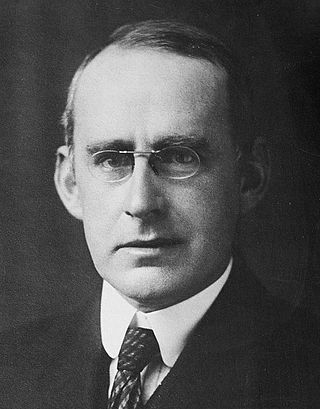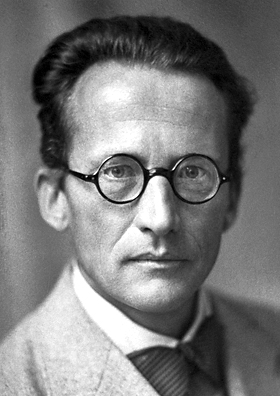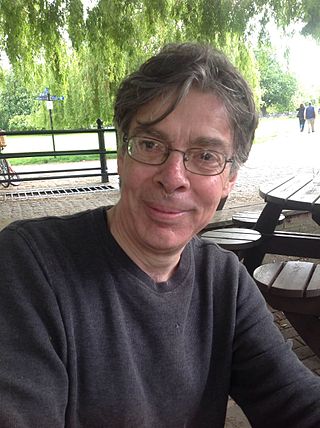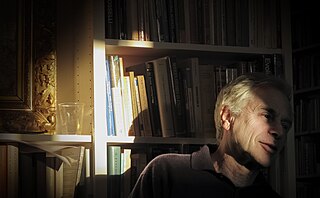
Sir Arthur Stanley Eddington was an English astronomer, physicist, and mathematician. He was also a philosopher of science and a populariser of science. The Eddington limit, the natural limit to the luminosity of stars, or the radiation generated by accretion onto a compact object, is named in his honour.

Erwin Rudolf Josef Alexander Schrödinger, sometimes written as Schroedinger or Schrodinger, was a Nobel Prize–winning Austrian and naturalized Irish physicist who developed fundamental results in quantum theory. In particular, he is recognized for postulating the Schrödinger equation, an equation that provides a way to calculate the wave function of a system and how it changes dynamically in time.

Henry Sidgwick was an English utilitarian philosopher and economist. He was the Knightbridge Professor of Moral Philosophy at the University of Cambridge from 1883 until his death, and is best known in philosophy for his utilitarian treatise The Methods of Ethics. He was one of the founders and first president of the Society for Psychical Research and a member of the Metaphysical Society and promoted the higher education of women. His work in economics has also had a lasting influence. In 1875, with Millicent Garrett Fawcett, he co-founded Newnham College, a women-only constituent college of the University of Cambridge. It was the second Cambridge college to admit women, after Girton College. In 1856, Sidgwick joined the Cambridge Apostles intellectual secret society.

Charles Margrave Taylor is a Canadian philosopher from Montreal, Quebec, and professor emeritus at McGill University best known for his contributions to political philosophy, the philosophy of social science, the history of philosophy, and intellectual history. His work has earned him the Kyoto Prize, the Templeton Prize, the Berggruen Prize for Philosophy, and the John W. Kluge Prize.

In astrophysics, the Eddington number, NEdd, is the number of protons in the observable universe. Eddington originally calculated it as about 1.57×1079; current estimates make it approximately 1080.

Sir James Hopwood Jeans was an English physicist, astronomer and mathematician.
Peter van Inwagen is an American analytic philosopher and the John Cardinal O'Hara Professor of Philosophy at the University of Notre Dame. He is also a research professor of philosophy at Duke University each spring. He previously taught at Syracuse University, earning his PhD from the University of Rochester in 1969 under the direction of Richard Taylor. Van Inwagen is one of the leading figures in contemporary metaphysics, philosophy of religion, and philosophy of action. He was the president of the Society of Christian Philosophers from 2010 to 2013.

Simon J. Schaffer is a historian of science, previously a professor of the history and philosophy of science at the Department of History and Philosophy of Science at the University of Cambridge and was editor of The British Journal for the History of Science from 2004 to 2009.

Richard Bevan Braithwaite was an English philosopher who specialized in the philosophy of science, ethics, and the philosophy of religion.

The University of Cambridge was the birthplace of the 'Analytic' School of Philosophy in the early 20th century. The department is located in the Raised Faculty Building on the Sidgwick Site and is part of the Cambridge School of Arts and Humanities. The Faculty achieved the best possible results from The Times 2004 and the QAA Subject Review 2001 (24/24). In the UK as of 2020, it is ranked second by the Guardian, second by the Philosophical Gourmet Report, and fifth by the QS World University Rankings.

Keith James Holyoak is a Canadian-American researcher in cognitive psychology and cognitive science, working on human thinking and reasoning. Holyoak's work focuses on the role of analogy in thinking. His work showed how analogy can be used to enhance learning of new abstract concepts by both children and adults, as well as how reasoning breaks down in cases of brain damage.

Dan Sperber is a French social and cognitive scientist and philosopher. His most influential work has been in the fields of cognitive anthropology, linguistic pragmatics, psychology of reasoning, and philosophy of the social sciences. He has developed: an approach to cultural evolution known as the epidemiology of representations or cultural attraction theory as part of a naturalistic reconceptualization of the social; relevance theory; the argumentative theory of reasoning. Sperber formerly Directeur de Recherche at the Centre National de la Recherche Scientifique is Professor in the Departments of Cognitive Science and of Philosophy at the Central European University in Budapest.

James Ward was an English psychologist and philosopher. He was a Cambridge Apostle.

The psychology of science is a branch of the studies of social science defined most simply as the study of scientific thought or behavior. It is a collection of studies of various topics. The thought of psychology has been around since the late 19th century. Research on the psychology of science began in 1874, the field has seen a substantial expansion of activity in recent years. The specific field of psychology as a science first gained popularity mostly in the 1960s, with Abraham Maslow publishing an influential text on the subject, but this popularity faded, only re-emerging in the 1980s. Other studies of science include philosophy of science, history of science, and sociology of science or sociology of scientific knowledge.

Stephan Körner, FBA was a British philosopher, who specialised in the work of Kant, the study of concepts, and in the philosophy of mathematics.
Gerd Buchdahl was a German-English philosopher of science.
Clive William Kilmister was a British mathematician who specialised in the mathematical foundations of physics, especially quantum mechanics and relativity.
The Legislative Council of Burma was the legislative body of British Burma from 1897 to 1936.
Hans Adolf Buchdahl was a German-born Australian physicist. He contributed to general relativity, thermodynamics and optics. He is particularly known for developing f(R) gravity and Buchdahl's theorem on the Schwarzschild's solution for the inside of a spherical star.

Sir Edmund Taylor Whittaker was a British mathematician, physicist, historian of science, and philosopher who authored three titles that remain in circulation over a century after their initial publications. His bibliography includes several books and over one hundred published papers on a variety of subjects, including mathematics, astronomy, mathematical physics, theoretical physics, philosophy, and theism. Whittaker's bibliography in the Biographical Memoirs of Fellows of the Royal Society categorises his publications into three categories: books and monographs, maths and physics articles, and biographical articles; the bibliography excludes works published in popular magazines like Scientific American. The bibliography includes eleven total books and monographs, fifty-six maths and physics articles, thirty-five philosophy and history articles, and twenty-one biographical articles. In the bibliography compiled by William Hunter McCrea in 1957, there are thirteen books and monographs and the same journal articles; McCrea counts all three volumes of A History of the Theories of Aether and Electricity as separate books and excludes the same papers. Whittaker's contributions to Scientific American include two book reviews and a popular article on mathematics.














